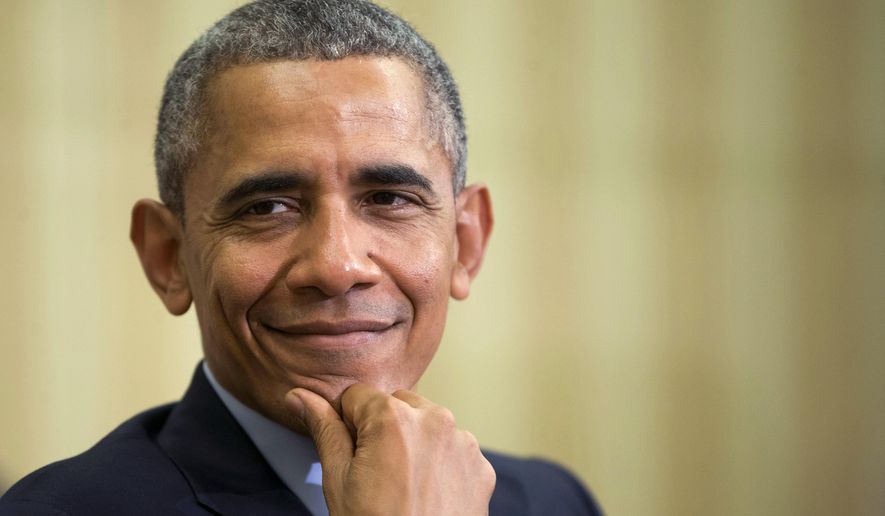Former President Barack Obama has given two cheers for gentrification to alleviate concerns about the effect of his presidential center on Chicago’s South Side.
During a community gathering Tuesday night at McCormick Place, the 44th president said fears that his library will uproot local businesses and residents are valid, but need to be balanced against the need for “more economic activity in the community.”
“I know that I heard a couple people saying, ’Well, we’re concerned about maybe rents might go up,’” Mr. Obama said. “Well here’s the thing. If you go into some neighborhoods in Chicago where there are no jobs, no businesses and nothing’s going on, in some cases the rent’s pretty cheap. But our kids are also getting shot on that block.”
Activists and conservationists have voiced their displeasure with current plans for the Barack Obama Presidential Center, which is not Mr. Obama’s official presidential library and will not house documents from his administration.
The plans as currently constituted call for the center’s construction at historic Jackson Park, a public parkland originally designed by Frederick Law Olmsted and Calvert Vaux, the landscape architects behind New York City’s famed Central Park.
The center also will cost taxpayers an estimated $100 million in renovations to the surrounding area.
More than 200 faculty members at the University of Chicago signed a public letter opposing construction of the Obama Presidential Center at its current location. The professors argue the center would do more good in a community desperately in need of economic revitalization, rather than on the lush Jackson Park lakefront.
“We are concerned that these are not the best ways to use public funds to invest in the future of Chicago,” the letter reads.
Community organizers also have unsuccessfully implored the Obama Foundation to sign a community benefits agreement guaranteeing jobs, benefits and controls on housing costs for residents of the South Side.
In his speech Tuesday, Mr. Obama dismissed some of the concerns as arbitrary and negligible. He said the Chicago media are giving a disproportionate amount of air time to that “one person who was unhappy” with the plans, regardless of “what the other 99 people say.”
“There’s going to be some folks who say, ’Well, you know what, we want the tower moved just to the left,’” Mr. Obama said, mimicking the center’s critics. “Or, ’You know, I don’t like how those trees are set up there.’ And then there are going to be some folks who say, ’Well, I just like things just the way they are, so I don’t want you all to do nothing, ’cause it might be noisy if kids might be coming to the park, so I like it empty.’ I’m just telling the truth now.”
“You can never make folks 100 percent happy,” the former president added.
Mr. Obama took two questions from audience members that were submitted online and screened in advance.
In response to one woman’s question about how the presidential center will revitalize the community without pushing out existing residents, he said the “big problem on the South Side” has never been “too much development.”
He said current residents shouldn’t be worried about gentrification because there’s “so much room” for development.
“Think of all the abandoned buildings and vacant lots that are around here,” Mr. Obama said. “We’ve got such a long way to go in terms of economic development before you’re even going to see the prospect of significant gentrification. Malia’s kids might have to worry about that.”
The Cultural Landscape Foundation, a D.C.-based nonprofit, has consistently called for putting the Obama Presidential Center on property owned by the University of Chicago, which won the bid to host the center, or vacant city land.
Charles A. Birnbaum, the conservation group’s president, said the abandoned buildings and vacant lots cited by Mr. Obama would be ideal locations for his presidential center.
“We agree with the former president,” Mr. Birnbaum said in a statement, “there are vacant lots on the South Side and other areas that could be used for the site of the Obama Presidential Center — public parkland does not need to be taken for it.”
Chicago zoning officials still have to approve plans for the Obama Presidential Center before construction can begin.
Mike Strautmanis, vice president of public engagement for the Obama Foundation, said the nonprofit plans to meet with the Chicago Plan Commission and go before the full city council this Spring.
The federal Advisory Council on Historic Preservation also has to review the proposed changes to Jackson Park, because it’s listed on the National Register of Historic Places.
• Bradford Richardson can be reached at brichardson@washingtontimes.com.




Please read our comment policy before commenting.